- Home
- Salman Rushdie
Midnight's Children Page 36
Midnight's Children Read online
Page 36
“Yaaaouuuu!” I scream with the pain; and my aunt, snapping out of the macabre spell of those few moments, pushes me off her and delivers a resounding wallop to my face. Fortunately, it is the left cheek; there is no danger of damage to my remaining good ear. “Badmaash!” my aunty screams, “A family of maniacs and perverts, woe is me, what woman ever suffered so badly?”
There is a cough in the doorway. I am standing up now, shivering with pain. Pia is standing, too, her hair dripping off her head like tears. Mary Pereira is in the doorway, coughing, scarlet confusion all over her skin, holding a brown paper parcel in her hands.
“See, baba, what I have forgotten,” she finally manages to say, “You are a big man now: look, your mother has sent you two pairs of nice, white long trousers.”
After I got so indiscreetly carried away while trying to cheer up my aunt, it became difficult for me to remain in the apartment on Marine Drive. Long intense telephone calls were made regularly during the next few days; Hanif persuading someone, while Pia gesticulated, that perhaps now, after five weeks … and one evening after I got back from school, my mother picked me up in our old Rover, and my first exile came to an end.
Neither during our drive home, nor at any other time, was I given any explanation for my exile. I decided, therefore, that I would not make it my business to ask. I was wearing long pants now; I was, therefore, a man, and must bear my troubles accordingly. I told my mother: “The finger is not so bad. Hanif mamu has taught me to hold the pen differently, so I can write okay.” She seemed to be concentrating very hard on the road. “It was a nice holiday,” I added, politely. “Thank you for sending me.”
“O child,” she burst out, “with your face like the sun coming out, what can I tell you? Be good with your father; he is not happy these days.” I said I would try to be good; she seemed to lose control of the wheel and we passed dangerously near a bus. “What a world,” she said after a time, “Terrible things happen and you don’t know how.”
“I know,” I agreed, “Ayah has been telling me.” My mother looked at me fearfully, then glared at Mary in the back seat. “You black woman,” she cried, “what have you been saying?” I explained about Mary’s stories of miraculous events, but the dire rumors seemed to calm my mother down. “What do you know,” she sighed, “You are only a child.”
What do I know, Amma? I know about the Pioneer Café! Suddenly, as we drove home, I was filled once again with my recent lust for revenge upon my perfidious mother, a lust which had faded in the brilliant glare of my exile, but which now returned and was united with my new-born loathing of Homi Catrack. This two-headed lust was the demon which possessed me, and drove me into doing the worst thing I ever did … “Everything will be all right,” my mother was saying, “You just wait and see.”
Yes, mother.
It occurs to me that I have said nothing, in this entire piece, about the Midnight Children’s Conference; but then, to tell the truth, they didn’t seem very important to me in those days. I had other things on my mind.
Commander Sabarmati’s Baton
A FEW MONTHS LATER, when Mary Pereira finally confessed her crime, and revealed the secrets of her eleven-year-long haunting by the ghost of Joseph D’Costa, we learned that, after her return from exile, she was badly shocked by the condition into which the ghost had fallen in her absence. It had begun to decay, so that now bits of it were missing: an ear, several toes on each foot, most of its teeth; and there was a hole in its stomach larger than an egg. Distressed by this crumbling spectre, she asked it (when she was sure nobody else was within earshot): “O God, Joe, what you been doing to yourself?” He replied that the responsibility for her crime had been placed squarely on his shoulders until she confessed, and it was playing hell with his system. From that moment it became inevitable that she would confess; but each time she looked at me she found herself prevented from doing so. Still, it was only a matter of time.
In the meanwhile, and utterly ignorant of how close I was to being exposed as a fraud, I was attempting to come to terms with a Methwold’s Estate in which, too, a number of transformations had occurred. In the first place, my father seemed to want nothing more to do with me, an attitude of mind which I found hurtful but (considering my mutilated body) entirely understandable. In the second place, there was the remarkable change in the fortunes of the Brass Monkey. “My position in this household,” I was obliged to admit to myself, “has been usurped.” Because now it was the Monkey whom my father admitted into the abstract sanctum of his office, the Monkey whom he smothered in his squashy belly, and who was obliged to bear the burdens of his dreams about the future. I even heard Mary Pereira singing to the Monkey the little ditty which had been my theme-song all my days: “Anything you want to be,” Mary sang, “you can be; You can be just what-all you want!” Even my mother seemed to have caught the mood; and now it was my sister who always got the biggest helping of chips at the dinner-table, and the extra nargisi kofta, and the choicest pasanda. While I—whenever anyone in the house chanced to look at me—was conscious of a deepening furrow between their eyebrows, and an atmosphere of confusion and distrust. But how could I complain? The Monkey had tolerated my special position for years. With the possible exception of the time I fell out of a tree in our garden after she nudged me (which could have been an accident, after all), she had accepted my primacy with excellent grace and even loyalty. Now it was my turn; long-trousered, I was required to be adult about my demotion. “This growing up,” I told myself, “is harder than I expected.”
The Monkey, it must be said, was no less astonished than I at her elevation to the role of favored child. She did her best to fall from grace, but it seemed she could do no wrong. These were the days of her flirtation with Christianity, which was partly due to the influence of her European school-friends and partly to the rosary-fingering presence of Mary Pereira (who, unable to go to church because of her fear of the confessional, would regale us instead with Bible stories); mostly, however, I believe it was an attempt by the Monkey to regain her old, comfortable position in the family doghouse (and, speaking of dogs, the Baroness Simki had been put to sleep during my absence, killed by promiscuity).
My sister spoke highly of gentle Jesus meek and mild; my mother smiled vaguely and patted her on the head. She went around the house humming hymns; my mother took up the tunes and sang along. She requested a nun’s outfit to replace her favorite nurse’s dress; it was given to her. She threaded chick-peas on a string and used them as a rosary, muttering Hail-Mary-full-of-grace, and my parents praised her skill with her hands. Tormented by her failure to be punished, she mounted to extremes of religious fervor, reciting the Our Father morning and night, fasting in the weeks of Lent instead of during Ramzàn, revealing an unsuspected streak of fanaticism which would, later, begin to dominate her personality; and still, it appeared, she was tolerated. Finally she discussed the matter with me. “Well, brother,” she said, “looks like from now on I’ll just have to be the good guy, and you can have all the fun.”
She was probably right; my parents’ apparent loss of interest in me should have given me a greater measure of freedom; but I was mesmerized by the transformations which were taking place in every aspect of my life, and fun, in such circumstances, seemed hard to have. I was altering physically; too early, soft fuzz was appearing on my chin, and my voice swooped, out of control, up and down the vocal register. I had a strong sense of absurdity: my lengthening limbs were making me clumsy, and I must have cut a clownish figure, as I outgrew shirts and trousers and stuck gawkily and too far out of the ends of my clothes. I felt somehow conspired against, by these garments which flapped comically around my ankles and wrists; and even when I turned inwards to my secret Children, I found change, and didn’t like it.
The gradual disintegration of the Midnight Children’s Conference—which finally fell apart on the day the Chinese armies came down over the Himalayas to humiliate the Indian fauj—was already well under way. When novelty
wears off, boredom, and then dissension, must inevitably ensue. Or (to put it another way) when a finger is mutilated, and fountains of blood flow out, all manner of vilenesses become possible … whether or not the cracks in the Conference were the (active-metaphorical) result of my finger-loss, they were certainly widening. Up in Kashmir, Narada-Markandaya was falling into the solipsistic dreams of the true narcissist, concerned only with the erotic pleasures of constant sexual alterations; while Soumitra the time-traveler, wounded by our refusal to listen to his descriptions of a future in which (he said) the country would be governed by a urine-drinking dotard who refused to die, and people would forget everything they had ever learned, and Pakistan would split like an amoeba, and the prime ministers of each half would be assassinated by their successors, both of whom—he swore despite our disbelief—would be called by the same name … wounded Soumitra became a regular absentee from our nightly meetings, disappearing for long periods into the spidery labyrinths of Time. And the sisters from Baud were content with their ability to bewitch fools young and old. “What can this Conference help?” they inquired. “We already have too many lovers.” And our alchemist member was busying himself in a laboratory built for him by his father (to whom he had revealed his secret); preoccupied with the Philosopher’s Stone, he had very little time for us. We had lost him to the lure of gold.
And there were other factors at work as well. Children, however magical, are not immune to their parents; and as the prejudices and world-views of adults began to take over their minds, I found children from Maharashtra loathing Gujaratis, and fair-skinned northerners reviling Dravidian “blackies”; there were religious rivalries; and class entered our councils. The rich children turned up their noses at being in such lowly company; Brahmins began to feel uneasy at permitting even their thoughts to touch the thoughts of untouchables; while, among the low-born, the pressures of poverty and Communism were becoming evident … and, on top of all this, there were clashes of personality, and the hundred squalling rows which are unavoidable in a parliament composed entirely of half-grown brats.
In this way the Midnight Children’s Conference fulfilled the prophecy of the Prime Minister and became, in truth, a mirror of the nation; the passive-literal mode was at work, although I railed against it, with increasing desperation, and finally with growing resignation … “Brothers, sisters!” I broadcast, with a mental voice as uncontrollable as its physical counterpart, “Do not let this happen! Do not permit the endless duality of masses-and-classes, capital-and-labor, them-and-us to come between us! We,” I cried passionately, “must be a third principle, we must be the force which drives between the horns of the dilemma; for only by being other, by being new, can we fulfill the promise of our birth!” I had supporters, and none greater than Parvati-the-witch; but I felt them slipping away from me, each distracted by his or her own life … just as, in truth, I was being distracted by mine. It was as though our glorious congress was turning out to be no more than another of the toys of childhood, as though long trousers were destroying what midnight had created … “We must decide on a program,” I pleaded, “our own Five Year Plan, why not?” But I could hear, behind my anxious broadcast, the amused laughter of my greatest rival; and there was Shiva in all our heads, saying scornfully, “No, little rich boy; there is no third principle; there is only money-and-poverty, and have-and-lack, and right-and-left; there is only me-against-the-world! The world is not ideas, rich boy; the world is no place for dreamers or their dreams; the world, little Snotnose, is things. Things and their makers rule the world; look at Birla, and Tata, and all the powerful: they make things. For things, the country is run. Not for people. For things, America and Russia send aid; but five hundred million stay hungry. When you have things, then there is time to dream; when you don’t, you fight.” The Children, listening fascinatedly as we fought … or perhaps not, perhaps even our dialogue failed to hold their interest. And now I: “But people are not things; if we come together, if we love each other, if we show that this, just this, this people-together, this Conference, this children-sticking-together-through-thick-and-thin, can be that third way …” But Shiva, snorting: “Little rich boy, that’s all just wind. All that importance-of-the-individual. All that possibility-of-humanity. Today, what people are is just another kind of thing.” And I, Saleem, crumbling: “But … free will … hope … the great soul, otherwise known as mahatma, of mankind … and what of poetry, and art, and …” Whereupon Shiva seized his victory: “You see? I knew you’d turn out to be like that. Mushy, like overcooked rice. Sentimental as a grandmother. Go, who wants your rubbish? We all have lives to live. Hell’s bells, cucumber-nose, I’m fed up with your Conference. It’s got nothing to do with one single thing.”
You ask: these are ten-year-olds? I reply: Yes, but. You say: did ten-year-olds, or even almost-elevens, discuss the role of the individual in society? And the rivalry of capital and labor? Were the internal stresses of agrarian and industrialized zones made explicit? And conflicts in socio-cultural heritages? Did children of less than four thousand days discuss identity, and the inherent conflicts of capitalism? Having got through fewer than one hundred thousand hours, did they contrast Gandhi and Marxlenin, power and impotence? Was collectivity opposed to singularity? Was God killed by children? Even allowing for the truth of the supposed miracles, can we now believe that urchins spoke like old men with beards?
I say: maybe not in these words; maybe not in words at all, but in the purer language of thought; but yes, certainly, this is what was at the bottom of it all; because children are the vessels into which adults pour their poison, and it was the poison of grown-ups which did for us. Poison, and after a gap of many years, a Widow with a knife.
In short: after my return to Buckingham Villa, even the salt of the midnight children lost its savor; there were nights, now, when I did not even bother to set up my nationwide network; and the demon lurking inside me (it had two heads) was free to get on with its devilment. (I never knew about Shiva’s guilt or innocence of whore-murders; but such was the influence of Kali-Yuga that I, the good guy and natural victim, was certainly responsible for two deaths. First came Jimmy Kapadia; and second was Homi Catrack.)
If there is a third principle, its name is childhood. But it dies; or rather, it is murdered.
We all had our troubles in those days. Homi Catrack had his idiot Toxy, and the Ibrahims had other worries: Sonny’s father Ismail, after years of bribing judges and juries, was in danger of being investigated by the Bar Commission; and Sonny’s uncle Ishaq, who ran the second-rate Embassy Hotel near Flora Fountain, was reputedly deep in debt to local gangsters, and worried constantly about being “bumped off” (in those days, assassinations were becoming as quotidian as the heat) … so perhaps it isn’t surprising that we had all forgotten about the existence of Professor Schaapsteker. (Indians grow larger and more powerful as they age; but Schaapsteker was a European, and his kind unfortunately fade away with the years, and often completely disappear.)
But now, driven, perhaps, by my demon, my feet led me upstairs to the top floor of Buckingham Villa, where I found a mad old man, incredibly tiny and shrunken, whose narrow tongue darted constantly in and out between his lips—flicking, licking: the former searcher after antivenes, assassin of horses, Sharpsticker Sahib, now ninety-two and no longer of his eponymous Institute, but retired into a dark top-floor apartment filled with tropical vegetation and serpents pickled in brine. Age, failing to draw his teeth and poison-sacs, had turned him instead into the incarnation of snakehood; like other Europeans who stay too long, the ancient insanities of India had pickled his brains, so that he had come to believe the superstitions of the Institute orderlies, according to whom he was the last of a line which began when a king cobra mated with a woman who gave birth to a human (but serpentine) child … it seems that all my life I’ve only had to turn a corner to tumble into yet another new and fabulously transmogrified world. Climb a ladder (or even a staircase) and you find a snake awai
ting you.
The curtains were always drawn; in Schaapsteker’s rooms, the sun neither rose nor set, and no clocks ticked. Was it the demon, or our mutual sense of isolation which drew us together? … Because, in those days of the Monkey’s ascendancy and the Conference’s decline, I began to ascend the stairs whenever possible, and listen to the ravings of the crazy, sibilant old man.
His first greeting to me, when I stumbled into his unlocked lair, was: “So, child—you have recovered from the typhoid.” The sentence stirred time like a sluggish dust-cloud and rejoined me to my one-year-old self; I remembered the story of how Schaapsteker had saved my life with snake-poison. And afterwards, for several weeks, I sat at his feet, and he revealed to me the cobra which lay coiled within myself.
Who listed, for my benefit, the occult powers of snakes? (Their shadows kill cows; if they enter a man’s dreams, his wife conceives; if they are killed, the murderer’s family is denied male issue for twenty generations.) And who described to me—with the aid of books and stuffed corpses—the cobra’s constant foes? “Study your enemies, child,” he hissed, “or they will surely kill you.” … At Schaapsteker’s feet, I studied the mongoose and the boar, the dagger-billed adjutant bird and the barasinha deer, which crushes snakes’ heads under its feet; and the Egyptian ichneumon, and ibis; the four-feet-high secretary bird, fearless and hook-beaked, whose appearance and name made me think suspicious thoughts about my father’s Alice Pereira; and the jackal buzzard, the stink cat, the honey ratel from the hills; the road runner, the peccary, and the formidable cangamba bird. Schaapsteker, from the depths of his senility, instructed me in life. “Be wise, child. Imitate the action of the snake. Be secret; strike from the cover of a bush.”

 Shame
Shame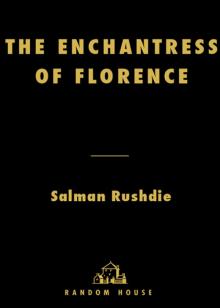 The Enchantress of Florence
The Enchantress of Florence Imaginary Homelands: Essays and Criticism 1981-1991
Imaginary Homelands: Essays and Criticism 1981-1991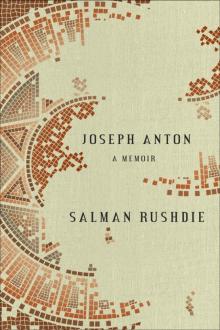 Joseph Anton: A Memoir
Joseph Anton: A Memoir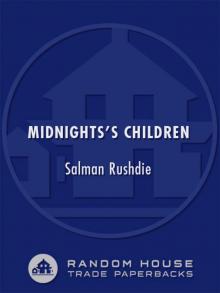 Midnight's Children
Midnight's Children East, West: Stories
East, West: Stories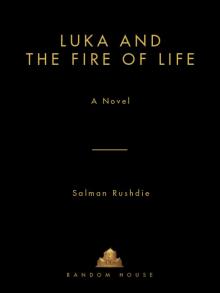 Luka and the Fire of Life
Luka and the Fire of Life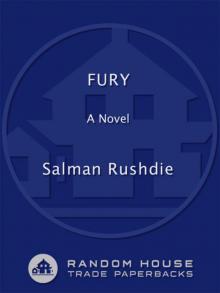 Fury Fury Fury
Fury Fury Fury Haroun and the Sea of Stories
Haroun and the Sea of Stories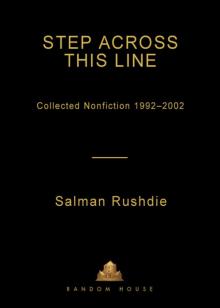 Step Across This Line: Collected Nonfiction 1992-2002
Step Across This Line: Collected Nonfiction 1992-2002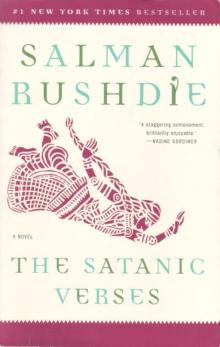 The Satanic Verses
The Satanic Verses The Moor's Last Sigh
The Moor's Last Sigh The Prophet's Hair
The Prophet's Hair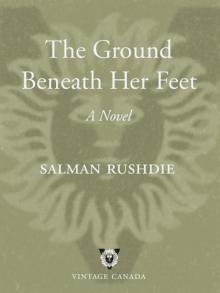 The Ground Beneath Her Feet
The Ground Beneath Her Feet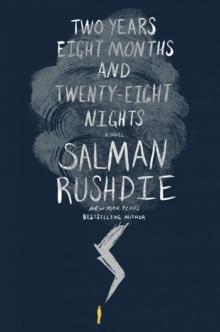 Two Years Eight Months and Twenty-Eight Nights
Two Years Eight Months and Twenty-Eight Nights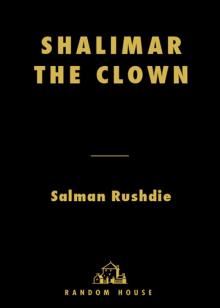 Shalimar the Clown
Shalimar the Clown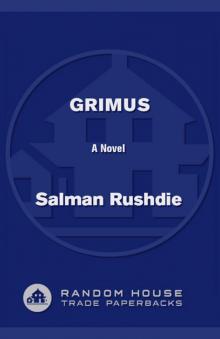 Grimus
Grimus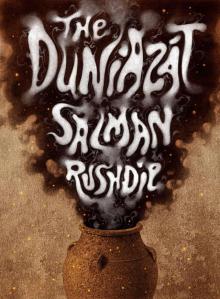 The Duniazát
The Duniazát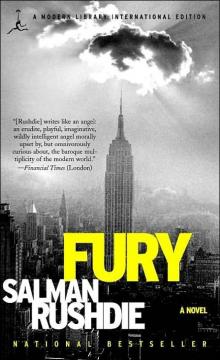 Fury
Fury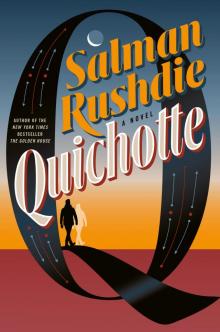 Quichotte
Quichotte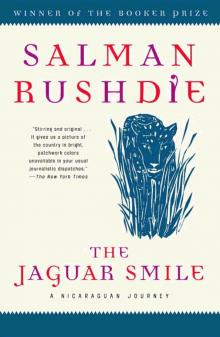 The Jaguar Smile
The Jaguar Smile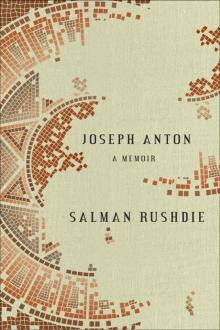 Joseph Anton
Joseph Anton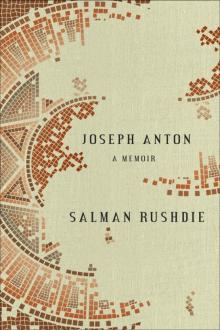 Joseph Anton: A Memoir: A Memoir
Joseph Anton: A Memoir: A Memoir Imaginary Homelands
Imaginary Homelands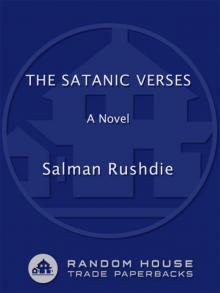 The Satanic Verses: A Novel
The Satanic Verses: A Novel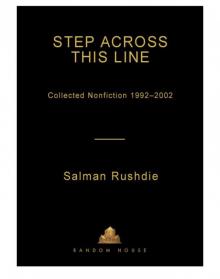 Step Across This Line
Step Across This Line East, West
East, West